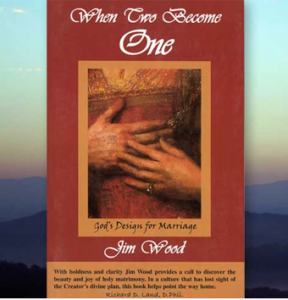“Haven’t you read,” he replied, “that he who created them in the beginning made them male and female, and he also said, ‘For this reason a man will leave his father and mother and be joined to his wife, and the two will become one flesh’? So they are no longer two, but one flesh. Therefore, what God has joined together, let no one separate.” Matthew 19:4-6
The failure to leave and cleave begins to show up in the little things in marriage. “I can’t understand why she doesn’t squeeze the toothpaste from the end up. Every time she takes the toothpaste tube, she just squeezes it wherever it’s fat. In no time the tube looks distorted and the toothpaste is wasted.”
“I don’t understand why he leaves the cap off the toothpaste. It’s not that big a deal to put the cap back on. Why is it so hard for him to remember?”
It isn’t just the toothpaste that gets to people. It’s also that she doesn’t even know how to put the tissue on the roll. It’s supposed to go over the top. She puts it on to roll under. These are the areas where the friction occurs. People feel ridiculous when they come to me for marriage counseling, and I ask, “What was your last argument about?” They didn’t come to complain about the toothpaste, but it is what the last argument was about. We feel silly being bugged by these things, but these are the things that bug us.
When Adam and Eve came together, God said the man was to leave his father and mother and cleave to his wife. Why did God say this? Who were Adam’s father and mother? Adam didn’t have a father and mother. Obviously, God was stating a principal that has to do with a lot more than Mom and Dad. Adam and Eve didn’t have parents or in-laws. Eve didn’t have to hear about Adam’s mother’s cooking, and he didn’t have to hear about all the guys she could’ve married. It isn’t just the man who must leave and cleave. Both must do this. It isn’t just leaving father and mother, but this is the best illustration of this principle.
What does it mean to leave? It’s not just a matter of geography. Some couples move all the way across the country from their parents, but they have never really left father and mother. Their sense of identity, their primary loyalty, their whole support system is still “back home.” Other couples live close to their parents, but they manage to make the break. They are on their own. It’s hard for Mom and Dad to let their children leave, even when they’re married. Parents need to realize that their children are commanded to leave mother and father. Don’t try to keep your children from doing God’s will.
Why leave father and mother? From infancy, we learn in the home what a family is like. What does the husband do? What does the wife do? What does the father do? What does the mother do? Repeatedly, couples come to me saying, “I used to promise myself I would never be like my parents, now I’m just like my dad (or my mom) and it scares me to death.”
Whether we like what we see or not, we learn from our parents how to behave. When we get into a situation that resembles one we experienced as a child, we start playing the memory tapes back in our minds, and we say the things we learned when we were little. We say the things we heard said. Furthermore, we expect the other person to respond with their lines, lines we hear on the memory tapes from our own childhood.
When I married Susan, she was second oldest of six. I was youngest of four. We grew up observing our parents at very different stages in their marriages. Susan’s parents were in their twenties when she was born. My parents were in their forties. Susan’s parents were new to marriage and parenting. My parents were experienced. As a result, Susan and I had to learn how to fight. The lines on our memory tapes bore no resemblance to each other. We discovered this after we got married.
When I was a child, my parents had resolved most of their conflicts; Susan, on the other hand, had often witnessed her parents expressing disagreement. Susan knew certain lines from her memory tapes and had expectations about what my response should be. But I have never learned those lines. When we got into an inevitable disagreement, she would give her line, but I didn’t know how to respond. She’d try another line and I really got confused. Of course, my parents had disagreements, too. But, I hadn’t been around to see them. They had worked through decades of married life before I came along.
So, Susan and I had to learn our own style of resolving disagreement. This is part of leaving. We can’t insist that our spouse behave like our parents. We had to learn new ways of expressing ourselves. We had to establish a new home with a unique personality. We had to learn how to fight fair. This is something all couples must learn. Everybody’s going to disagree. As Ruth Graham‘s father used to say, “If both partners agree on everything, one of them is unnecessary.”
The goal is oneness, but you don’t start out at the goal. You have to run the race. It isn’t just a matter of leaving father and mother. It’s a matter of leaving all those preconceived standards and comparisons. Too many couples enter marriage with the thought, “This person has all the raw materials to make a great spouse. With a few years of hard work, I believe I can turn them into one.” This is a recipe for conflict.
Featured Resource:



